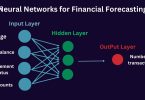In a variety of industries, artificial intelligence (AI) has emerged as a transformative force. The banking sector is no exception. Over the once many times, AI has revolutionized the way fiscal institutions operate, offering innovative results that ameliorate effectiveness, delicacy, and client gests . This essay delves into the significant impact of AI in finance, exploring its operations, advantages, challenges, and the implicit future it holds for the financial assiduity.
AI for Financial Operations
- Fraud Detection and Prevention
One of the critical operations of AI in finance is fraud discovery and forestallment. Traditional styles of relating fraudulent deals frequently lag and fail to keep up with the evolving tactics of cybercriminals. AI- powered systems can dissect vast quantities of data in real- time, detecting unusual patterns and anomalies to proactively help fraudulent conditioning, securing both financial institutions and guests.
- Algorithmic Trading
AI has revolutionized trading strategies with the preface of algorithmic trading. By assaying literal request data, AI algorithms can identify trends and patterns, executing trades at high speed and effectiveness, while minimizing mortal bias. This approach has led to bettered liquidity and reduced trading costs, making requests more effective.
- Credit Risk Assessment
Assessing credit threat is a pivotal aspect of financial institutions’ operations. AI- driven credit scoring models influence vast datasets to estimate a borrower’s creditworthiness more directly. This has enabled lenders to make better- informed opinions, leading to reduced dereliction rates and enhanced portfolio operation.
- Client Service and Chatbots
AI- powered chatbots have converted client service in the financial industry. These virtual sidekicks can handle routine client queries, give individualized recommendations, and grease smoother relations, enhancing overall client satisfaction and reducing response times.
- Personalized Financial Advice
AI technologies have enabled the development of substantiated financial advisory services. By assaying an existent’s financial history, investment preferences, and threat forbearance, AI algorithms can offer acclimatized investment strategies, empowering guests to make informed opinions aligned with their pretensions.
Benefits of AI in finance
- Enhanced Data Analysis
AI’s capability to reuse and dissect vast quantities of data at inconceivable pets has significantly bettered financial analysis. This enables financial institutions to make data- driven opinions, relating trends and perceptivity that would be grueling to uncover using traditional styles.
- Bettered threat operation
AI’s advanced prophetic capabilities have revolutionized threat operation. By assaying literal data and request trends, AI algorithms can identify implicit pitfalls and vulnerabilities, allowing financial institutions to develop further effective threat mitigation strategies.
- Cost Reduction and effectiveness
The robotization capabilities of AI’ve led to significant cost savings and increased functional effectiveness in the fiscal assiduity. Tasks that were formerly time- consuming and labor- ferocious, similar as data entry, conciliation, and report generation, can now be handled more efficiently by AI systems, allowing mortal workers to concentrate on further strategic tasks.
- Enhanced client Experience
AI- powered chatbots and virtual sidekicks have converted the client experience in finance. These systems give instant support, individualized recommendations, and round- the- timepiece vacuity, icing guests admit timely and applicable backing.
Challenges of AI
- Data sequestration and Security
AI’s effectiveness heavily relies on data vacuity and quality. This raises enterprises regarding data sequestration and security, as financial institutions handle sensitive client information. securing data from breaches and icing compliance with nonsupervisory norms is a consummate challenge.
- Bias and Fairness
AI algorithms are susceptible to bias, especially when trained on literal data that may contain essential impulses. This poses a challenge in the environment of credit scoring and loan blessings, as prejudiced algorithms could immortalize being inequalities in the financial system.
- Regulatory Compliance
Integrating AI in finance requires adherence to strict nonsupervisory fabrics to insure fair practices, consumer protection, and translucency. fiscal institutions must navigate complex regulations to insure their AI- driven results misbehave with assiduity norms.
- Interpretability and Explainability
AI models, particularly deep literacy algorithms, can be delicate to interpret and explain. This lack of translucency raises enterprises about responsibility and hinders decision- makers’ capability to understand the logic behind AI- driven issues.
- Resistance to Change
The relinquishment of AI in finance frequently faces resistance from traditional stakeholders who may be reluctant to trust automated systems with critical fiscal opinions. satisfying stakeholders of the benefits and trustability of AI results requires effective communication and demonstration of successful executions.
Future of AI in Finance
The future of AI in the financial industry appears promising, as technological advancements continue to shape the geography. Some implicit developments include
- Advancements in AI Ethics
As AI becomes more pervasive in finance, addressing bias, fairness, and ethical enterprises will be consummate. The development of AI ethics fabrics and guidelines will guide the responsible deployment of AI in financial institutions.
- Reinforcement Learning in Trading
Reinforcement Learning, a branch of AI that allows systems to learn from relations, may play a more significant part in algorithmic trading. These systems can continuously acclimatize and ameliorate trading strategies grounded on real- time request feedback.
- AI- Driven Regulatory Compliance
AI can streamline compliance processes by automating nonsupervisory reporting, monitoring, and icing adherence to changing compliance norms. This would help financial institutions stay over- to- date with evolving regulations while reducing compliance costs.
- Enhanced Virtual sidekicks
AI- powered virtual sidekicks are anticipated to come more sophisticated, offering hyperactive- individualized financial advice and product recommendations grounded on real- time data and client relations.
AI has surfaced as a game- changer in the financial assiduity, transubstantiating operations, perfecting effectiveness, and enhancing client gests . The wide- ranging operations of AI, from fraud discovery to substantiated financial advice, have demonstrated its eventuality to revise finance. Still, financial institutions must navigate challenges related to data sequestration, bias, and nonsupervisory compliance to completely realize AI’s benefits responsibly.








Leave a Comment